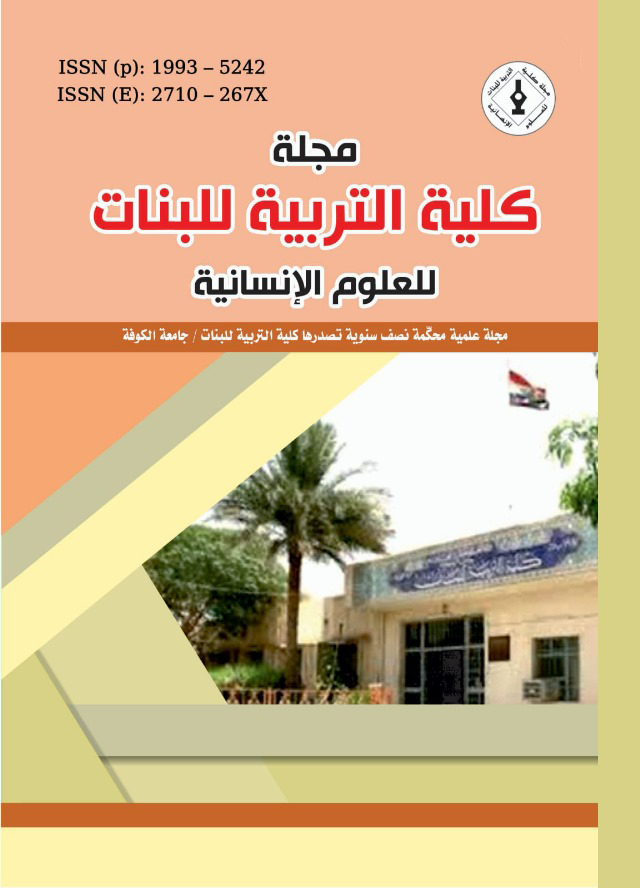Abstract
The Qur’anic text included two types of association, the first (free) repercussions
achieved by the missionary and prophetic communication of the events of the divine
will, while the second is (constrained) by the events of the human will. The semantic
type, as for the second type, was embodied in the parable discourse (narrative) in
sensuous, lived and imagined events that are supposed to occur. Among these
repercussions is what was mentioned in the style of the human missionary discourse,
which leads - in the whole of the Holy Qur’an - to the regression of the events of the
party of the human discourse due to the deterioration of its means of argument.
Including the Christians’ attempt to despise the Messenger of God (may God’s
prayers and peace be upon him and his family). The finite in the human soul, which is
contained according to other perceptible events in the worldly life in the hereafter,
conjectural events based on uncontrolled human interpretation embodied an
important aspect of these repercussions, especially in the story of the people of the
cave
achieved by the missionary and prophetic communication of the events of the divine
will, while the second is (constrained) by the events of the human will. The semantic
type, as for the second type, was embodied in the parable discourse (narrative) in
sensuous, lived and imagined events that are supposed to occur. Among these
repercussions is what was mentioned in the style of the human missionary discourse,
which leads - in the whole of the Holy Qur’an - to the regression of the events of the
party of the human discourse due to the deterioration of its means of argument.
Including the Christians’ attempt to despise the Messenger of God (may God’s
prayers and peace be upon him and his family). The finite in the human soul, which is
contained according to other perceptible events in the worldly life in the hereafter,
conjectural events based on uncontrolled human interpretation embodied an
important aspect of these repercussions, especially in the story of the people of the
cave
Keywords
and situational narrative association
external events experienced through the senses and observation.
Narrative essay association
syntactic
the parable story
Verbal
vocal
Abstract
تضمّن النصّ القرآنيّ نمطين من التداعي الأوّلى تداعيات(حرّة)حقّقها التّبليغ الرّساليّ والنبويّ لأحداث
الإرادة الإلهيّ أمّا ألثّانية فـ(مقيّدة)بأحداث الإرادة البشريّة ، وطالعنا النّصّ الكريم بخطابين لتلك
التّداعيات الأوّل:لغويّ(إشاريّ)بجزئيّاته الحكائيّة(الحركيّة والصّوتيّة والمقطعيّة واللفظيّة
والتّركيبيّة)وبعمقها الدّلاليّ ، أمّا النّمط الثّاني فجسّده الخطاب المثَليّ(الحكائيّ)في أحداث حسّيّة معيشة
وأخرى متخيّلة مفترضة الوقوع ومن تلك التّداعيات ما ورد بإسلوب الخطاب(السّجاليّ)الرّساليّ البشريّ
المفضى –في عموم القرآن الكريم- إلى تراجع أحداث طرف الخطاب البشريّ بفعل تداعي حججه
وإنحسار وسائلها المنجزة من ذلك محاولة النصارى مباهلة رسول الله(صلّى الله عليه وآله) ، وطالعنا النّصّ
الكريم بتداعيات عقديّة منبثقة من تقابل متضاد بين أحداث التّبليغ الرّساليّ المجسّد لمطلق الإرادة الإلهيّة
وأحداث الإرادة البشريّة برؤى مقيّدة ، ومن الحكايات الواقعة خارج الإرادة البشريّة تداعيات أسرار
الموت الباعثة على القلق غير المتناهي في النّفس البشريّة التي وردت على وفق أحداث مدركة في الحياة
الدّنيا وأخرى مرتقبة الوقوع في الآخرة ، وجسّدت الأحداث الحدسيّة القائمة على التّأويل البشريّ غير
المنضبط جانبا هامّا من تلك التّداعيات ولاسيّما في قصّة أهل الكهف
الإرادة الإلهيّ أمّا ألثّانية فـ(مقيّدة)بأحداث الإرادة البشريّة ، وطالعنا النّصّ الكريم بخطابين لتلك
التّداعيات الأوّل:لغويّ(إشاريّ)بجزئيّاته الحكائيّة(الحركيّة والصّوتيّة والمقطعيّة واللفظيّة
والتّركيبيّة)وبعمقها الدّلاليّ ، أمّا النّمط الثّاني فجسّده الخطاب المثَليّ(الحكائيّ)في أحداث حسّيّة معيشة
وأخرى متخيّلة مفترضة الوقوع ومن تلك التّداعيات ما ورد بإسلوب الخطاب(السّجاليّ)الرّساليّ البشريّ
المفضى –في عموم القرآن الكريم- إلى تراجع أحداث طرف الخطاب البشريّ بفعل تداعي حججه
وإنحسار وسائلها المنجزة من ذلك محاولة النصارى مباهلة رسول الله(صلّى الله عليه وآله) ، وطالعنا النّصّ
الكريم بتداعيات عقديّة منبثقة من تقابل متضاد بين أحداث التّبليغ الرّساليّ المجسّد لمطلق الإرادة الإلهيّة
وأحداث الإرادة البشريّة برؤى مقيّدة ، ومن الحكايات الواقعة خارج الإرادة البشريّة تداعيات أسرار
الموت الباعثة على القلق غير المتناهي في النّفس البشريّة التي وردت على وفق أحداث مدركة في الحياة
الدّنيا وأخرى مرتقبة الوقوع في الآخرة ، وجسّدت الأحداث الحدسيّة القائمة على التّأويل البشريّ غير
المنضبط جانبا هامّا من تلك التّداعيات ولاسيّما في قصّة أهل الكهف
Keywords
تداعي الحكائيّ المقاليّ، اللفظيّ،الصّوتيّ،التّركيبيّ، والتداعي الحكائيّ المقاميّ،الحكاية المثليّة،أحداث خارجيّة معيشة بالحسّ والمشاهدة.
